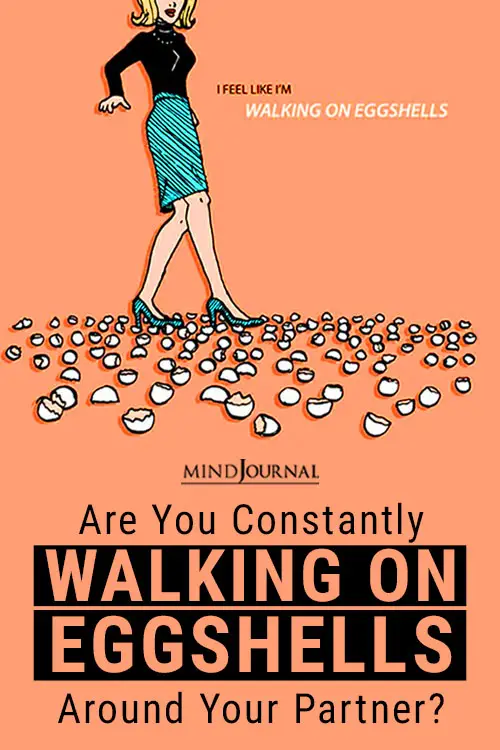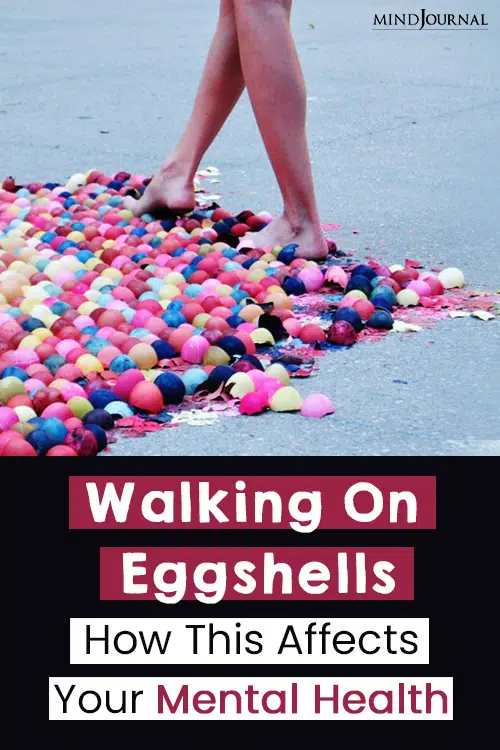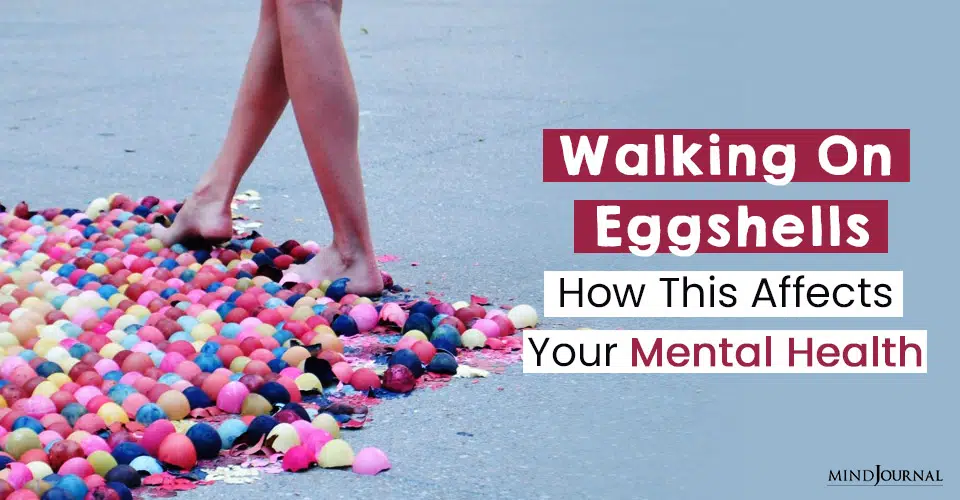When you are in a relationship and are constantly walking on eggshells around your partner, maybe it’s time to evaluate why you are doing this, when you are around the person you LOVE.
In love relationships, hurt has a way of lingering in the times between resentful, angry, or emotionally abusive flare-ups. The empty, dull ache of unhappiness is the accumulative effect of these small moments of disconnection, isolation, and dread.
If you live with a resentful, angry, or emotionally abusive partner, you probably have a vague feeling, at least now and then, that you’ve lost yourself. In your constant efforts to tiptoe around someone else’s moods, in the hope of avoiding blow-ups, put-downs, criticism, sighs of disapproval, or cold shoulders, you constantly edit what you say and do.
You second-guess your own judgment, your own ideas, and your own preferences. You begin to question whether the way you think is valid and right. Ultimately, your perceptions of reality and your sense of self-change for the worse.
The cold fact is that it’s hard not to lose yourself in the morass of what you should say or do to keep things peaceful. If you have to act in a certain way one minute and behave a different way in another (depending on your partner’s moods), your confidence and sense of self can seem to disappear. You begin to feel that you can’t reclaim yourself or begin to feel better until your partner changes and starts treating you better.
The understandable but tragic impression that you are dependent on your partner for your emotional well-being is the first thing you must change.
Your pain tells you that you need to become the fully alive person you’re meant to be. This means that you need to remove the focus from your partner and put it squarely on reclaiming your inner voice. That also happens to be the best thing you can do the help your partner and your relationship.
Related: 7 Signs You Need Immediate Emotional Healing
No One In The Family Escapes The Effects Of Walking On Eggshells
Families do not communicate primarily by language. That might surprise you until you consider that humans bonded in families for millennia before we had language. Even today, the most sensitive communications that have the most far-reaching consequences to our lives occur between parents and infants through tone of voice, facial expressions, touch, scent, and body posture, not language.
Though less obvious than interactions with young children, most communications with older children and partners occur through an unconscious process of emotional attunement. We attune our emotions to the people we love.
That’s how you can come home in one mood, find your partner or children in a different mood, and, bam!—all of a sudden, out of nowhere, you’re in their mood.
Emotional attunement, not verbal skills, determines how we communicate, from our choice of words to our tone of voice. If attuned to a positive mood, you are likely to communicate pleasantly. If you’re in a negative mood, whatever words you choose will be less than pleasant.
Now here’s the really bad news. Due to the unconscious, automatic process of emotional attunement, your children are painfully reactive to the walking-on-eggshells atmosphere between their parents, even if they never hear you say a harsh word to each other.
Everyone in a walking-on-eggshells family loses some degree of dignity and autonomy. Half suffer from clinical anxiety and/or depression. (“Clinical” doesn’t mean feeling down or blue or worried, it means that the symptoms interfere with normal functioning. You can’t sleep, can’t concentrate, can’t work as efficiently, and can’t enjoy yourself without drinking.) Most of the adults lack genuine self-esteem (based on realistic self-appraisals), and the children rarely feel as good as other kids.
The most common symptom of children in families who walk on eggshells is depression. But the signs can fool you; childhood depression looks different from the weeping, withdrawn, or sullen adult version. In children, the disorder resembles chronic boredom. Children normally have high levels of interest, enjoyment, and excitement. If your child is not interested in the things in which children are normally interested, lacks enthusiasm, and is seldom excited, he or she is probably depressed.
Related: The Childhood Wounds We Carry In Adulthood When We Were Deprived of Love
Another common symptom of children is anxiety, particularly worry about things that children do not normally worry about, like how their parents are going to get through the evening with each other.
Many kids have school problems, show aggressive tendencies, hyperactivity, and either high emotional intensity—anger, excitability, or frequent crying that seem to come out of nowhere—or the polar opposite: no emotions at all. In the latter condition, they can look like little stone children; you could slice up a puppy in front of them and they wouldn’t care. They have turned off all emotions to avoid the pain of walking on eggshells.
As adults, children raised in a walking-on-eggshells atmosphere are at risk of becoming resentful, angry, and emotionally abusive.
One piece of research might startle you. Witnessing a parent victimized is usually more psychologically damaging to children than injuries from direct child abuse. In my own family, that was certainly true. I have only the faintest recollections of child abuse—a small hole in my skull and a knocked-out front tooth. But I have vivid memories of seeing my mother ignored, dismissed, demeaned, and terrified. Seeing a parent abused is profound child abuse.
Hope
The emotional dysregulation that makes families walk on eggshells is mostly habit. It’s sad that hurtful behaviors have been repeated frequently enough to form habits, yet therein lies some hope. Habits can be changed, by developing new habits.
Resentful and angry partners cope with discomfort of any kind by blaming it on someone, denying responsibility for problems, or avoiding, through distractions, alcohol, drugs, or compulsive behavior.
Blame, denial, and avoidance are toddler coping mechanisms, which begin around age two. When adults use toddler coping mechanisms, they suffer feelings of powerlessness. The adrenaline of anger and resentment temporarily allows them to feel more powerful. But they must stay at least a little resentful or angry to maintain more powerful feelings. That means more blame, denial, avoidance, in a relentless downward spiral.
Related: How Childhood Trauma Is Screwing Up Your Relationships
The good news is that resentful and angry partners can practice converting toddler coping mechanisms into more empowering adult coping mechanisms of improve, appreciate, connect, protect.
When they develop, through repetition, habits of improving, appreciating, connecting, protecting, the family will be delivered from walking on eggshells.
Take the walking on eggshells test.
Visit Dr. Steven Stosny’s website Compassion Power for many more interesting articles.
Written By Steven Stosny Originally Appeared In Psychology Today










Leave a Reply
You must be logged in to post a comment.